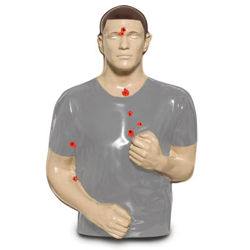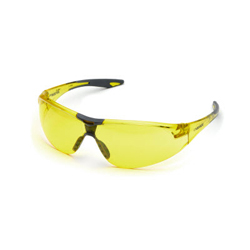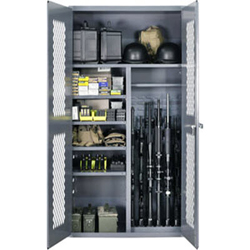By Captain Brian C. Smith
Editor’s Note: This article was originally published in The Chief of Police, Volume XIX. The views in this article are the author’s own and don’t necessarily represent those of Action Target, Inc.
 A good friend, Deputy Gloria Anderson of the Cook County Sheriff’s Police Department, who is aware of my background in firearms training, expressed on several occasions about several of her female co-workers who were experiencing difficulties in passing their departmental service weapon range qualification. During one of these conversations, when the topic arose, I began to pry into some of the problems the female co-workers were experiencing with their weapons and departmental qualifications. I later determined that it appears the problem of the ladies in mention, may be a fear of their weapon due to lack of familiarization.
A good friend, Deputy Gloria Anderson of the Cook County Sheriff’s Police Department, who is aware of my background in firearms training, expressed on several occasions about several of her female co-workers who were experiencing difficulties in passing their departmental service weapon range qualification. During one of these conversations, when the topic arose, I began to pry into some of the problems the female co-workers were experiencing with their weapons and departmental qualifications. I later determined that it appears the problem of the ladies in mention, may be a fear of their weapon due to lack of familiarization.
I extended an offer for the female deputies to attend a class that was designed and developed for shooters to become more familiar with their weapons, whether it’s their duty or off-duty weapon. This course was developed for the Chicago Heights Police Department, during that period of time in the mid 1990’s, when former United States President William Clinton signed the bill that proposed to increase the population of police officers nationwide by 100,000. On a local level, our agency’s sworn personnel had increased by 25 percent with a constant flow of turnover of police officers leaving other police agencies to join our agency and vice-versa. Our police personnel were leaving this department to seek better job opportunities and all the police agencies in our area were experiencing the same problem.
Our agency’s rules and regulations specified what weapons were approved for duty and off duty carry. Therefore, police officers from other agencies that were seeking employment with the Chicago Heights Police Department that were sworn in to serve on this police department must adhere to the current weapons policy and could only carry the two weapon manufacturers that we’re specified.
That’s why this eight-hour course was designed to familiarize the newly appointed police officer with the operations of his/her weapon, if they had to trade or purchase a weapon that would meet department specification. This course would allow a newly appointed police officer transitioning from another police agency to participate with their new firearm and challenge the many scenarios that the course had to offer and to familiarize themselves with their weapon.
Deputy Anderson organized a group of female police officers to participate in the class with hopes that the females would be more familiar with their firearm and overcome their fears. The class was scheduled for October 15, 2005, at the Harvey Police Department outdoor range. The women who reported to the range were all seasoned veterans and displayed an attitude, a degree of cockiness, and at the same time somewhat apprehensive because of not knowing what to expect. The female officers were from Cook County Sheriff’s Police, Markham Police, and the Federal Reserve’s Bank Police. The class was briefed of the overall class itinerary, along with range rules and expectations.
These expectations included our philosophy on a military style of regiment discipline in the class where any infractions that occurred on the range will result in penalties and the shooters as a class must suffer the punishment of three push-ups per penalty. Once the logistics were covered and the shooters’ equipment was inspected, the class proceeded to the firing line. The class is titled SURVIVAL SHOOTING TACTICS FOR ARMED CONFRONTATIONS, where each shooter is expected to bring approximately 300 rounds and anticipate getting dirty by shooting in a variety of shooting positions.
The class started by practicing reloading drills with dummy rounds and later progressed to live fire. Then after a series of live fire exercises, where the shooters were directed to reload quickly, some shooters were still reloading with nonchalant attitudes. The class then progressed to the next stage of a dueling drill where each shooter stood ten feet apart and was armed with “Simunitions”—converted semi-auto pistols with empty magazines in the weapons with one magazine loaded with one “Simunition” round and placed in the shooter’s mag pouch. The shooters were wearing paintball masks for safety, when on the command; the shooters faced each other, reloaded quickly to shoot their opponent before being shot.
During this drill, the feedback from the class was they now understood the importance of the quick reload and this drill began the humbling process among the women and the attitudes and their resistance began to diminish. We estimated that by the conclusion of the class, the group must have performed approximately 60 pushup for the penalties committed by the class members. Also at the conclusion of the class, the female officers openly admitted that prior to attending this class, that they thought they were familiar with their weapons. They also expressed that they now realized that their departmental qualification is only to test their accuracy in achieving a qualifying score for department records, which does not prepare them to shoot under stress or manipulate the weapon under stress or challenge themselves in job related scenarios.
The female officers were very appreciative and expressed a desire to establish an advanced class to further challenge and enhance their skills. It was a fulfilling moment to witness the women during the pushups and challenges that we put forth to members of this class, that this training may save their lives. They left the class enlightened, humbled, and confident in what they had achieved this date.
About the Author
Captain Brian C. Smith is a 28-year veteran of the Chicago Heights Police Department and is currently serving as Commander of Training and Special Operations. He has 21 instructor certifications and four armorer certifications. Captain Smith has an associate degree in law enforcement from Thornton Community College and graduated from tile 184th session of the FBI National Academy. He is member of the Illinois Tactical Officers Association, National Tactical Officer Association, ASLET, IALEF, and the American Federation of Police and Concerned Citizens, where he serves as Chairman of the Survival Tactics Committee.







If ony I can impress upon my Deapartment the seriousness of having this type of training for the entire angency, I would sleep a whole lot better at night. I’m not waiting for my Department to implement such training, I have already started personal training along this level at Pierre Basic Guns. thanks for this awesome article